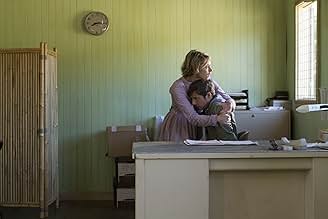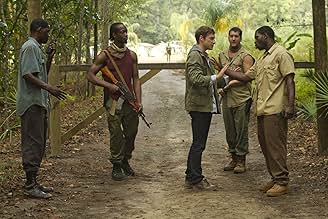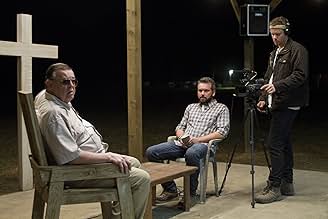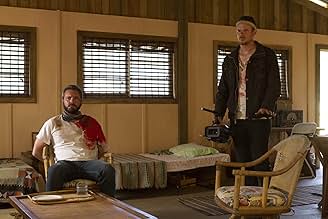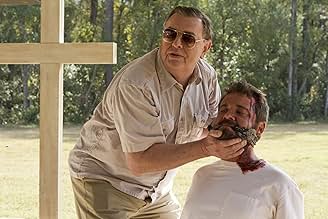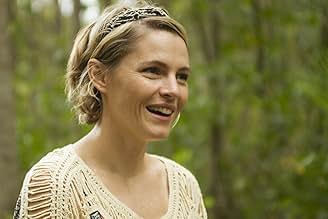A news team trails a man as he travels into the world of Eden Parish to find his missing sister, where it becomes apparent that this paradise may not be as it seems.A news team trails a man as he travels into the world of Eden Parish to find his missing sister, where it becomes apparent that this paradise may not be as it seems.A news team trails a man as he travels into the world of Eden Parish to find his missing sister, where it becomes apparent that this paradise may not be as it seems.
- Director
- Writer
- Stars
- Awards
- 4 wins & 12 nominations total
Reginald Lashaun Clay
- Robert
- (as Lashaun Clay)
Christian Ojore Mayfield
- Pilot
- (as Christian O'Jore)
- Director
- Writer
- All cast & crew
- Production, box office & more at IMDbPro
6.122.7K
1
2
3
4
5
6
7
8
9
10
Featured reviews
"This is the last sacrament."
Most people seem to dislike the "found-footage" genre, though I personal like to see what stories filmmakers can create and develop it as a found-footage (mostly horror). I did like the first 3 installments of "Paranormal Activity," I absolutely loved "Cloverfield," and "The Blair Witch Project" did scare me. Thus, if you found more than one of these repulsive, ignore my review. I will also warn that this is obviously not a movie for everyone. After watching this movie, I can say that I came out very disturbed and mortified, which was Ti West's intentions (I presume). The whole film feels very real, and I did enjoy Gene Jones and Amy Seimitz's terrifyingly surreal acting. Most people will see this movie knowing how it'll end since it's based on the Jonestown massacre (don't look this up if you don't know it!!!), but that doesn't mean there weren't other aspects of the movie that weren't entertaining. For what the movie is about, I was surprised to still be jumping in my seat and breathing heavily at moments of great suspense. My only complaints about the film were some of the choices Ti West chose to move the story (those moments where the audience knows they are doing something very stupid and it feels unrealistic that they would do that to begin with). Some criticism I've heard is that it takes forever to get to the "good" parts. I'm going to argue that that is false criticism unless you are only looking to watch a 95 minute movie filled with terror and suspense. Yes, the first half of the movie doesn't have very much suspense, but there is still a chilling mood creeping up every minute. Plus, the chemistry between the actors is great and entertaining!
Seemed on the right track, but pattered out to uninteresting
The film is among the found footage genre. It leads in with some decent photography, nice ambient soundtrack, and some pretty good acting. The suspense builds with a decent and slow momentum, but unfortunately doesn't lead to anything interesting or unique. The film had a really nice opportunity to go down a different path. It had all the qualities to do so and be good. Unfortunately it just decided to re hash an old story and try to deliver it as something new. I can give it five out of 10 for keeping me interested until the climax good photography and nice track, but the subsequent let down can't allow me to give it anything higher. If you are interested in something like this I would recommend a documentary on Jonestown. There are many good ones out there.
Don't Look Away
I was born in 83, so anything I know of Jonestown has been gleaned from podcasts, documentaries, or anniversary television broadcasts. Even that is much more than some.
And that's how it works, right? As much as we hate to admit it, as time moves on, everything (and I do mean *everything*) fades from memory. Go ahead and ask a 16 yr old nowadays who Jim Jones or David Koresh were - I bet they'll roll their eyes and assume you're talking about an 80s rock band lead. That fading and moving on of time is exactly why the remake/prequel/sequel/reboot industry is a thing of the Millennial age that never was before.
In order for history (good, bad, or indifferent) to continue to be passed along, the stories have to be retold and reincarnated in ways that are more appealing to those who come after. So maybe The Sacrament doesn't come right out and say, "Hey, we remade Guyana," but I sincerely doubt any of the filmmakers involved thought that viewers of the right age were going to mistake the story for anything else. Another movie that tells a variation of Jonestown without acknowledging it is "The Veil" btw.
As far as found footage films go, this one is high quality cinematography-wise. I thought the casting was actually fairly impressive, and despite knowing exactly where the story was headed, I did find the second half hard to watch; it did give me insight into Jonestown in a way that was truly shocking.
Worth a watch. Won't blow your mind, or bring home an Oscar, but Ti West is always hit or miss with me (mostly miss) and this one wasn't too bad. If you would rather see Jonestown through a less modern, less horror-genre lens, then by all means, go watch the stuff made in the 80s.
And that's how it works, right? As much as we hate to admit it, as time moves on, everything (and I do mean *everything*) fades from memory. Go ahead and ask a 16 yr old nowadays who Jim Jones or David Koresh were - I bet they'll roll their eyes and assume you're talking about an 80s rock band lead. That fading and moving on of time is exactly why the remake/prequel/sequel/reboot industry is a thing of the Millennial age that never was before.
In order for history (good, bad, or indifferent) to continue to be passed along, the stories have to be retold and reincarnated in ways that are more appealing to those who come after. So maybe The Sacrament doesn't come right out and say, "Hey, we remade Guyana," but I sincerely doubt any of the filmmakers involved thought that viewers of the right age were going to mistake the story for anything else. Another movie that tells a variation of Jonestown without acknowledging it is "The Veil" btw.
As far as found footage films go, this one is high quality cinematography-wise. I thought the casting was actually fairly impressive, and despite knowing exactly where the story was headed, I did find the second half hard to watch; it did give me insight into Jonestown in a way that was truly shocking.
Worth a watch. Won't blow your mind, or bring home an Oscar, but Ti West is always hit or miss with me (mostly miss) and this one wasn't too bad. If you would rather see Jonestown through a less modern, less horror-genre lens, then by all means, go watch the stuff made in the 80s.
Jonestown
This was an almost exact telling of the Jonestown Massacre. The only differences were the date because it was present day, a film crew came with a parishioners relative rather than a congressman and there were not as many victims.
Good Story in an Irritating Genre
The journalist Patrick (Kentucker Audley) works at the VICE, a company dedicated to cover bizarre news. When his sister Caroline (Amy Seimetz) joins a community, she travels abroad with her new family. Out of the blue, Caroline invites her brother to visit her in an undefined country and Patrick travels by helicopter with his friends Jake (Joe Swanberg) and Sam (AJ Bowen) that work with him at VICE.
They find weird that the men that have come to guide them to the Eden Parish have guns. On the arrival to the camp, Patrick, Sam and Jake find a community of happy people that worship Father (Gene Jones). They interview Father but soon they realize that people are not as happy as they seem to be. Further, they find that they are trapped in the Parish Eden and they want to leave the place with the newcomers. But the Father does not have intention to let them go.
"The Sacrament" is a suspenseful horror movie with a music score in the beginning that recalls "The Twilight Zone". However this awful "found- footage" genre spoils the creepy story. The Dogma 95 has only 77 recognized movies, but this rip-off of the genre seems to be the easiest means to produce cheap low-budget movies in the present days. My vote is five.
Title (Brazil): "O Sacramento" ("The Sacrament")
They find weird that the men that have come to guide them to the Eden Parish have guns. On the arrival to the camp, Patrick, Sam and Jake find a community of happy people that worship Father (Gene Jones). They interview Father but soon they realize that people are not as happy as they seem to be. Further, they find that they are trapped in the Parish Eden and they want to leave the place with the newcomers. But the Father does not have intention to let them go.
"The Sacrament" is a suspenseful horror movie with a music score in the beginning that recalls "The Twilight Zone". However this awful "found- footage" genre spoils the creepy story. The Dogma 95 has only 77 recognized movies, but this rip-off of the genre seems to be the easiest means to produce cheap low-budget movies in the present days. My vote is five.
Title (Brazil): "O Sacramento" ("The Sacrament")
Found Footage Picks From the Directors of 'V/H/S/Halloween'
Found Footage Picks From the Directors of 'V/H/S/Halloween'
We asked the directors of V/H/S/Halloween to curate a list of some of their favorite found footage films, including some classics of the sub-genre and some deep cuts to add to your Watchlist.
Did you know
- TriviaGene Jones nailed his big interview scene in a single seventeen minute take.
- ConnectionsFeatured in WatchMojo: Top 10 Creepy Cults in Movies (2015)
- SoundtracksHeartbeats
Words and Music by Olof Dreijer (as Olof Bjorn Dreijer) & Karin Dreijer (as Karin Elizabeth Dreijer Andersson)
© Universal - Polygram International Publishing Inc. On behalf of Bert's Songs Ltd. (ASCAP)
Performed by The Knife
Courtesy of Mute & Rabid Records
By arrangement with Bank Robber Music
- How long is The Sacrament?Powered by Alexa
Details
Box office
- Budget
- $4,000,000 (estimated)
- Gross US & Canada
- $9,221
- Opening weekend US & Canada
- $583
- Jun 8, 2014
- Gross worldwide
- $9,221
- Runtime
- 1h 39m(99 min)
- Color
- Sound mix
- Aspect ratio
- 1.85 : 1
Contribute to this page
Suggest an edit or add missing content





